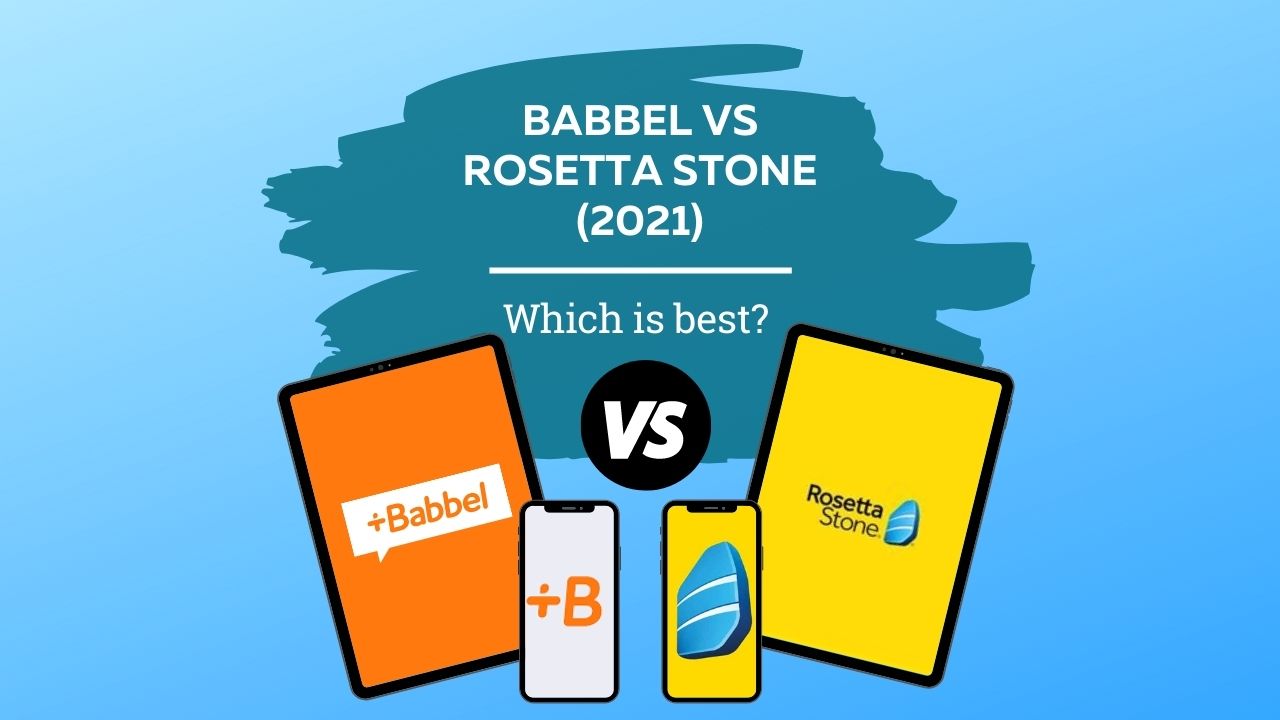
This article is a comparison of two of the most well-known online programmes for learning a new language: Babbel vs Rosetta Stone. Both of these apps teach a range of languages using pre-recorded words and phrases, as well as speech recognition technology to test your pronunciation.
In this review, I’ll take you inside the members' areas of both apps and show you their main features and differences, then share my honest opinion on which is better.
Main Differences
Babbel:
- Paid subscription (you pay per language)
- 14 languages including English
- Includes explanations and translations in English
Rosetta Stone:
- Paid subscription (unlimited languages if you pay for 12 months+)
- 25 languages, including two English (UK and US) and two Spanish (Spain and Latin America).
- Target language is used exclusively
The Cost
Babbel: A 12-month course costs US $83.40 for one language.
Rosetta Stone: A 12-month course costs US $95.88 for unlimited languages.
Babbel vs Rosetta Stone: The Verdict
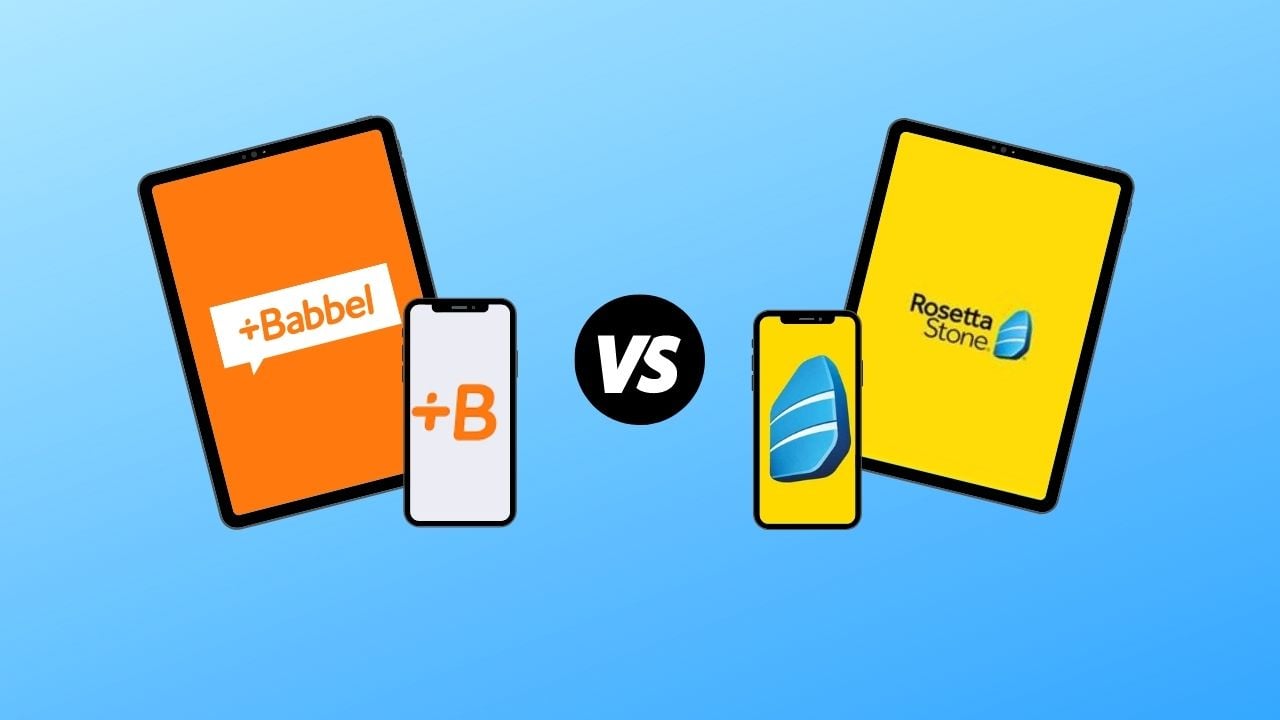
Babbel is a trending app and Rosetta Stone has been around so long that everyone has heard of it. Since both are popular and have many subscribers, there must be something to them – right?
My opinion is that both of these programs have sufficient content for introducing you to the bare basics of a new language. But I don't believe either one is a strong enough course to make you a fluent and natural speaker. Neither offers a fully immersive experience – you're just learning words and phrases.
That said, many people have enjoyed learning with both of these apps and I think if one of them matches your learning style, you could gain something from signing up as an absolute beginner.
In short:
Babbel is a good choice if you want a variety of different lesson types and to hear real-life conversations that you can practice up to an intermediate level. It’s not that great with motivation and the exercises aren’t very exciting, but the actual teaching is decent quality.
Rosetta Stone is a good choice if you learn best with pictures and memory techniques (in other words, repetition). It gives you thorough pronunciation practice of individual words and sentences, with a focus on phonetics. If you’re not a lover of flashcard learning, these exercises won’t thrill you, but you’ll probably remember basic speech patterns well.
(My top recommendation for language learners is my Uncovered courses, which teach you through StoryLearning®. Click here to find out about Uncovered.)
What Is Babbel?

Babbel is an app that pretty much everyone has heard of, as they’ve been very active on social media lately. You can use this app to learn one of 13 languages, most of which are the mainstream, popular ones. Babbel will work well on your smartphone, tablet, laptop or desktop computer and the lessons can sync across devices.
Lessons with Babbel are interactive: users are shown new vocabulary, phrases or grammar and then prompted to answer questions. These take the form of quiz-style matching, speaking and fill-in-the-blanks. To advance through the lessons, you have to answer correctly, and there’s a section where you can see your achievements and set yourself goals.
Babbel teaches real-life dialogue from the first lesson and their aim is to help you learn both actively and passively through context. They do a better job with this on the bigger languages than the less-studied ones.
What Is Rosetta Stone?
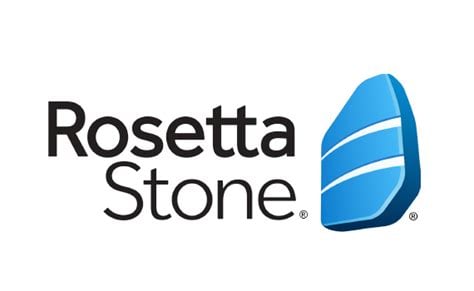
Rosetta Stone has been one of the biggest names in language learning since 1992. The old version came in big CD-ROM boxes, but the modern version is an app you can download. It works well on a web browser and is compatible with Android and Apple devices, although I find lessons extremely slow to process on a smartphone.
Like Babbel, Rosetta Stone is interactive. The focus is on audiovisual learning, but using your target language only. Lessons consist of associating spoken words with images you see on-screen and then matching them up.
At the end of each lesson you receive a % score and you either pass or fail that lesson. You can see a breakdown of how well you did per language skill: pronunciation, writing, grammar, vocabulary and listening. You then have a choice between redoing failed lessons or just moving ahead.
Rosetta Stone takes the approach of teaching language the way babies learn: without the help of translation. We’ll talk more about that later, but first let’s have a closer peek inside the two apps…
A Look At Babbel’s Lessons
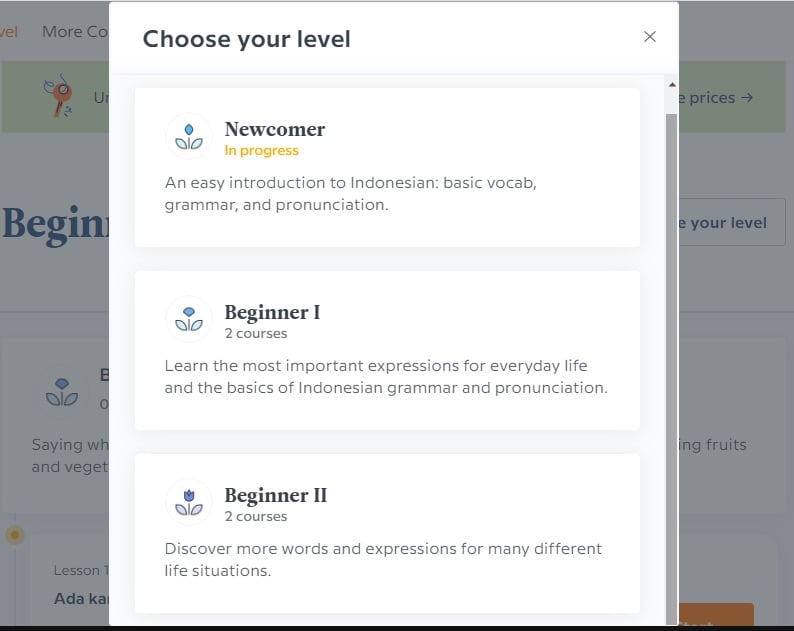
Babbel has 6 proficiency levels, from Newcomer to Advanced (although some languages only have the lower levels.) Each level has 1 to 5 courses and inside each course is 7 to 12 lessons.
The courses follow particular themes, such as “Talking about where you live”, “Numbers from 30 to 100” and “Outdoor activities”.
In a beginner ‘Listen and repeat’ lesson, for example, you will see a photograph and hear a native speaker say what it is. The phrase and the translation are written underneath. Using the voice recorder, you have to say the phrase.
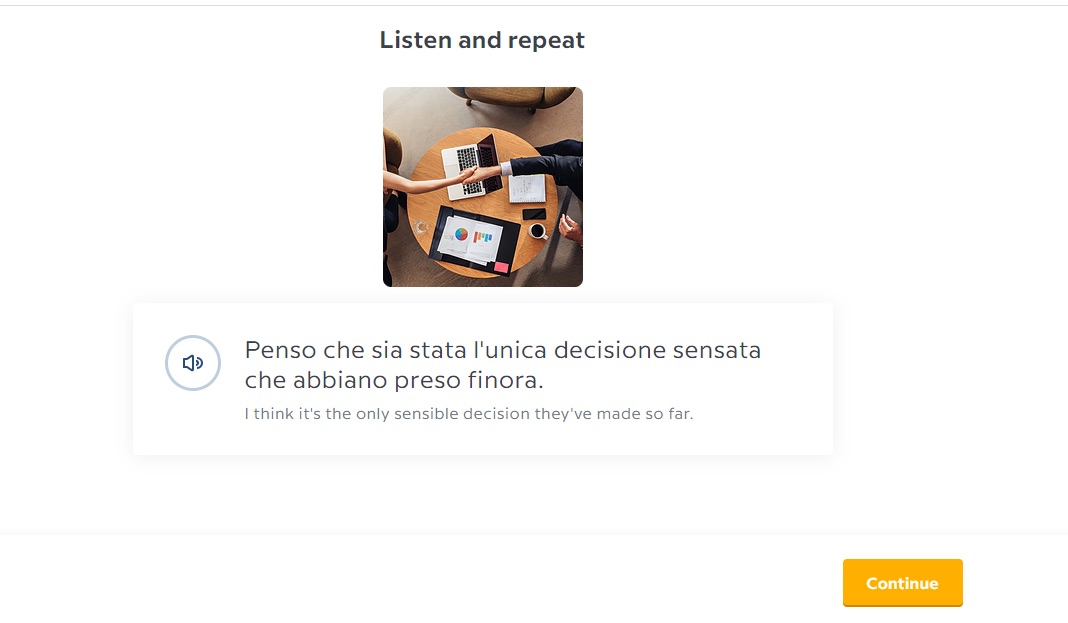
The exercise following that is ‘Choose the correct translation’. Here, you hear a native speaker say some phrases and see them written – without translations. Your job is to click the phrase that matches what you heard. The lessons continue in this way, getting gradually more challenging.
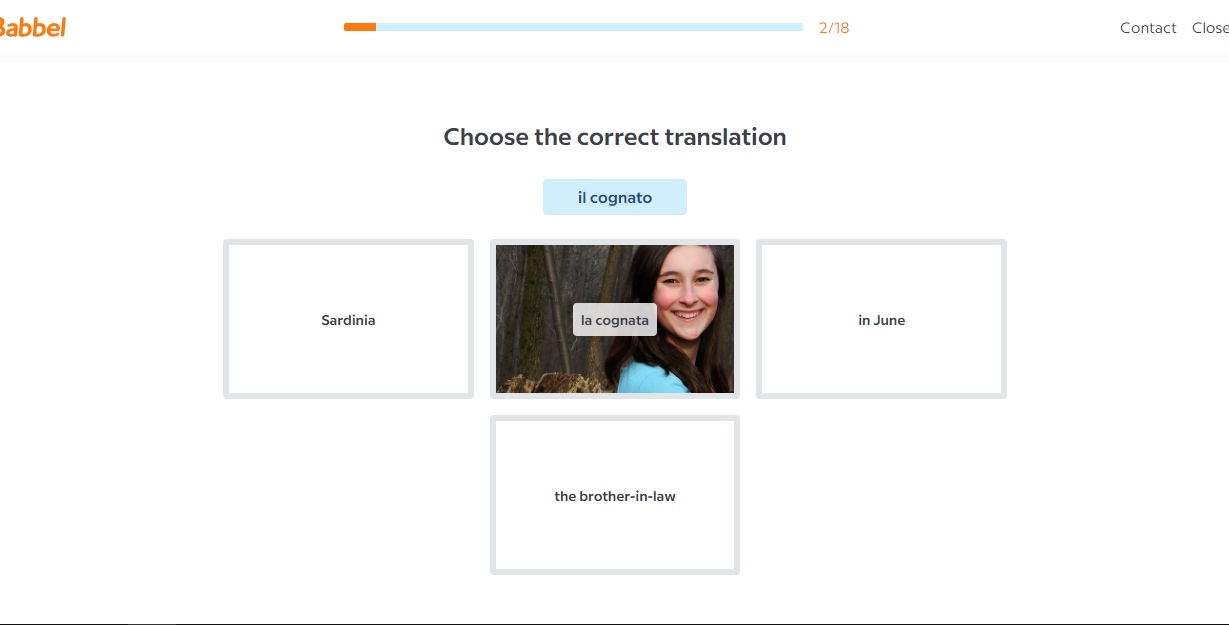
You will also get pronunciation practice with ‘repeat the phrase’ exercises, for which Babbel has a built-in speech recognition tool. Better courses like French bring in a lot of really useful and authentic dialogue, even though there’s little opportunity to actually practice conversations.
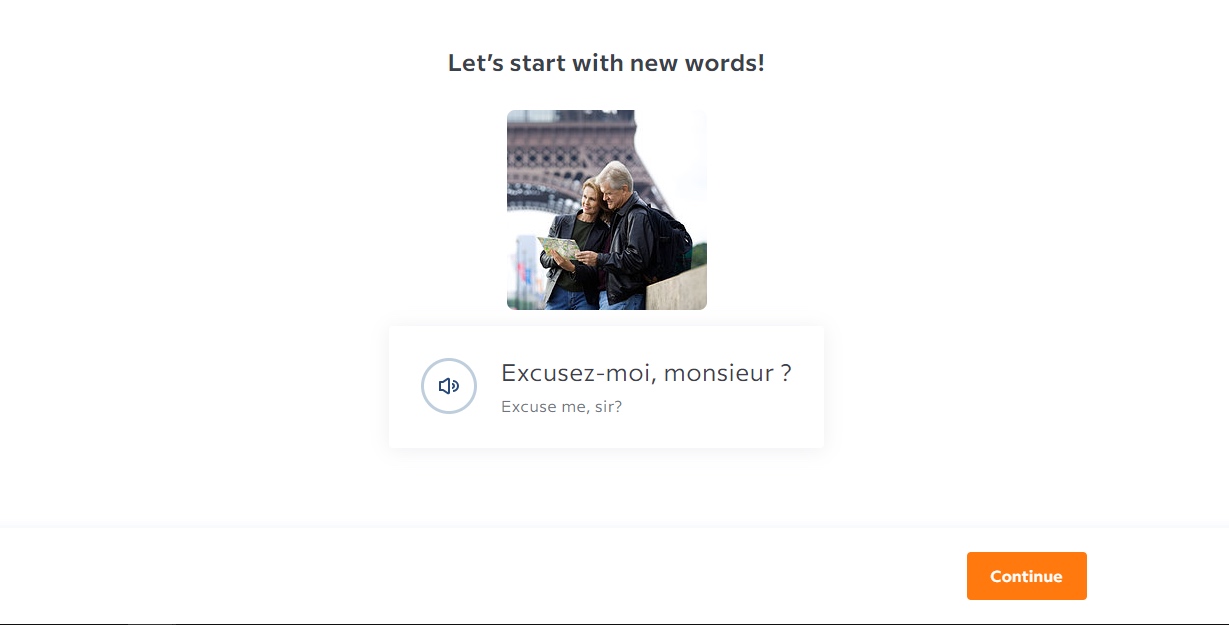
Babbel’s lessons are broken down into small chunks that are easy to understand and follow, making it a pretty straightforward learning process. They do a great job of blending grammar teaching into the lessons, and you also have an optional extra grammar section where you can practice all of the basics.
Your current course and the lesson lineup are displayed on your screen and it shows you what percentage you’ve completed. Learners work their way through a logical progression of fluency levels; it’s possible to skip levels or particular courses, but you can’t skip ahead during an actual lesson.
What I Like About Babbel
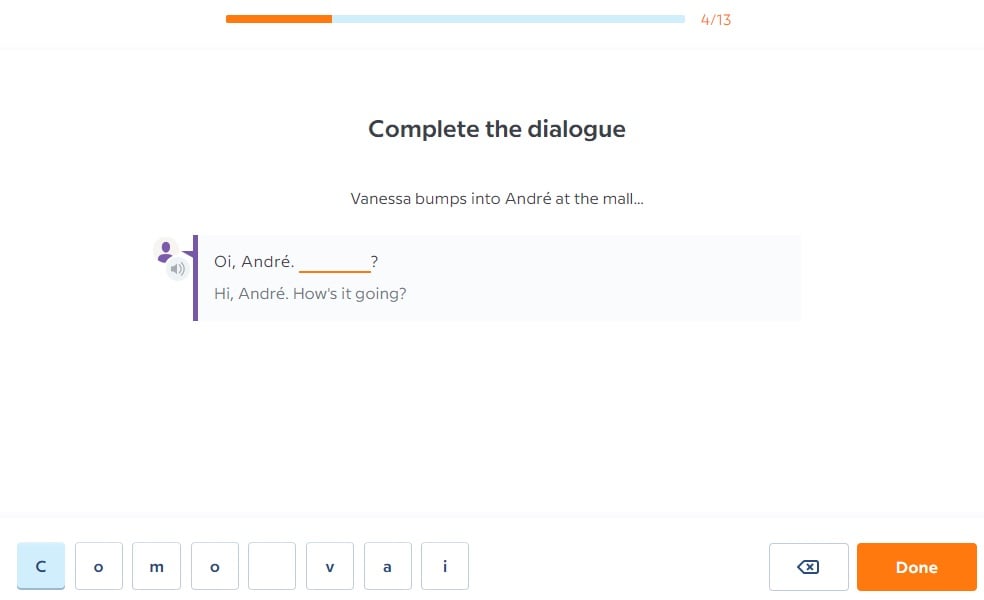
- The Spanish and French courses are great, with richer content than the other languages.
- There are some really good opportunities for practicing your grammar, especially in the supplementary grammar section. During lessons, you’re given pop-up tips whenever a grammar point comes up.
- Babbel is useful for learning vocabulary, phrases and basic sentence structure at the lower levels, which can give you a decent foundation in your language of choice. The dialogue you hear introduces plenty of life-like sentences you can use naturally in conversations – particularly on the French and Spanish courses.
- The structure of the lessons is good and learners are taken on a logical journey from Newcomer to Advanced.
- A few of the languages have podcasts, which is awesome! If only there were more of these, and for all 13 languages. The most immersive experience you’ll have with Babbel is listening to some uninterrupted conversations in the podcasts.
- You can download lessons to work when you’re offline, which is helpful. The downside is that offline mode is only available in the app, so you can’t use this feature on your desktop.
- Easily-navigated user interface with a straightforward lesson procedure.
What I Don’t Like About Babbel
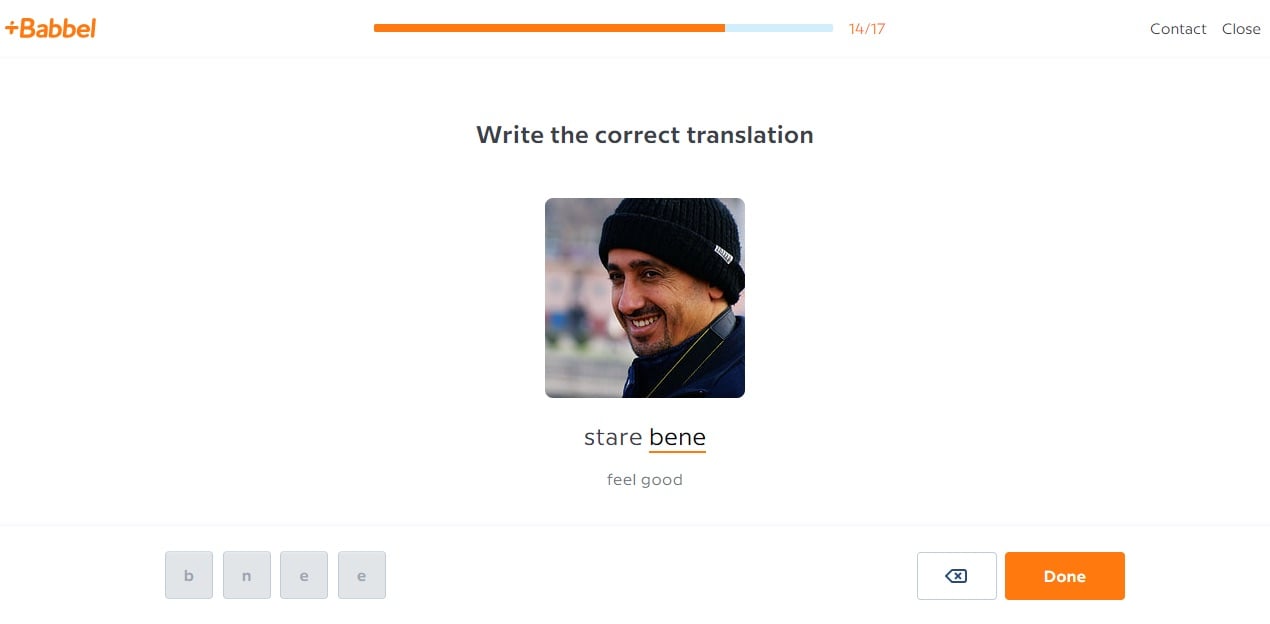
- The exercises are a bit tedious and not much fun to do. You can’t simply skip past any you don’t like, either, as a correct answer is required to move on.
- No opportunity to develop your speaking skills. Babbel is not exactly a deeply immersive encounter and the lessons seem to be entirely centered on vocabulary and grammar. This is a pity, since language absorption is about spending as much time as possible with the language.
- The lesson content is unevenly distributed. Lower levels have plenty of material to work with, but there’s too little content at higher levels.
- There are only 13 languages to choose from. So if you were hoping to learn Chinese, Japanese, Thai, Korean or Cantonese, Babbel won’t work for you.
- Far less content available for languages like Russian, Norwegian or Indonesian, which is a pity when these are such awesome languages to learn. Russian, for one, is fast becoming an important language; there’s no point starting it with an app that can only teach you the absolute basics. The courses with the most engaging content are Spanish, German and French.
A Look At Rosetta Stone’s Lessons
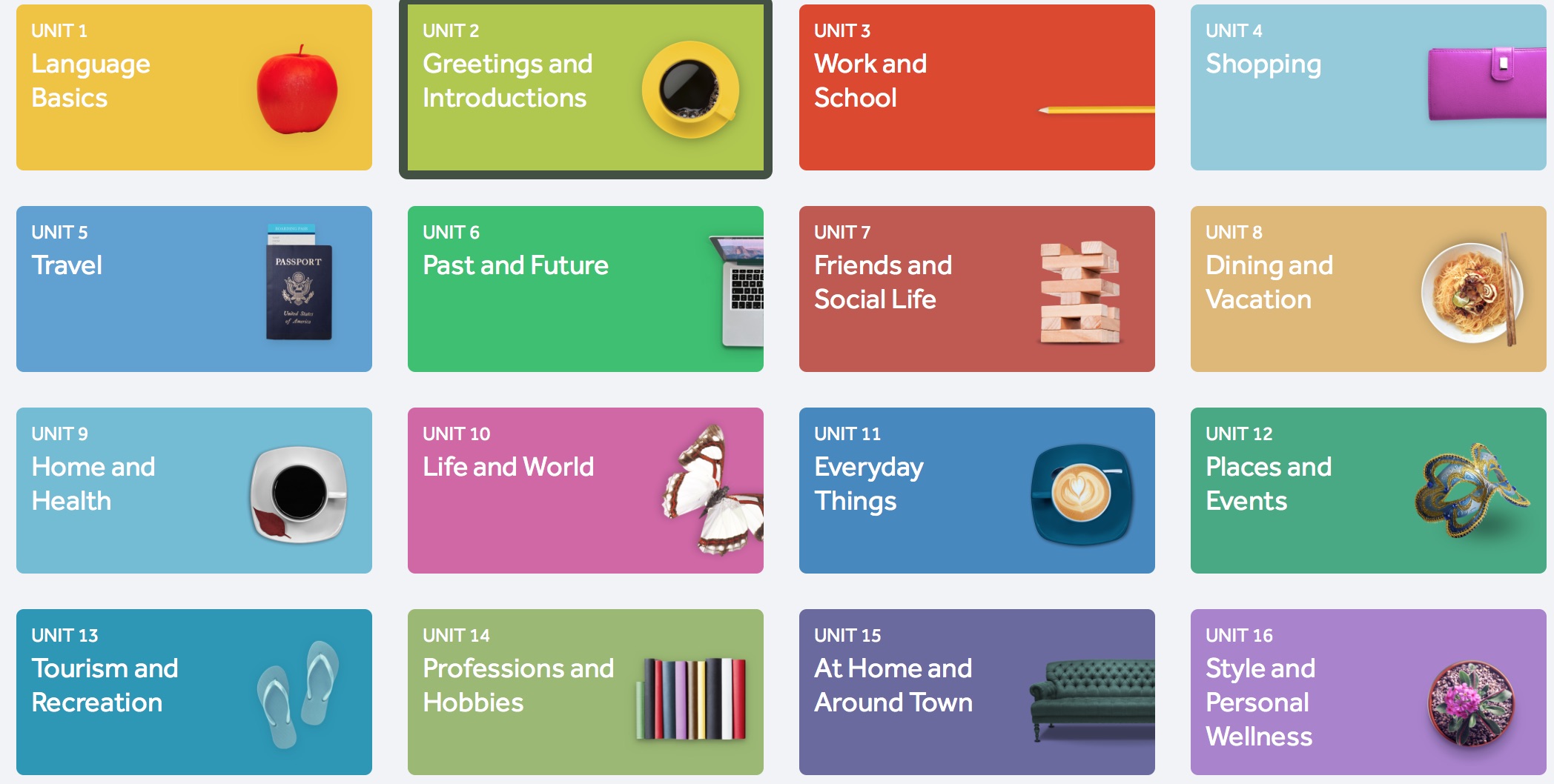
Rosetta Stone has 12 or 20 units, depending on the language, and each unit comprises 4 to 5 levels. Each unit emphasizes different vocabulary and language skills, including pronunciation, vocabulary, grammar, reading and writing. Bear in mind that some languages only cover a few of these skills.
The lessons consist of matching words to pictures. For example, in a beginner lesson you’ll see four images of a boy and a girl either eating or drinking; a woman’s voice says the equivalent of ‘the girl eats’ and ‘the girl drinks’ and the words appear above the girl pictures.
You then hear a man’s voice saying the equivalent of ‘the boys eats’ and ‘the boy drinks’, and by logical deduction, you match his words to the boy.
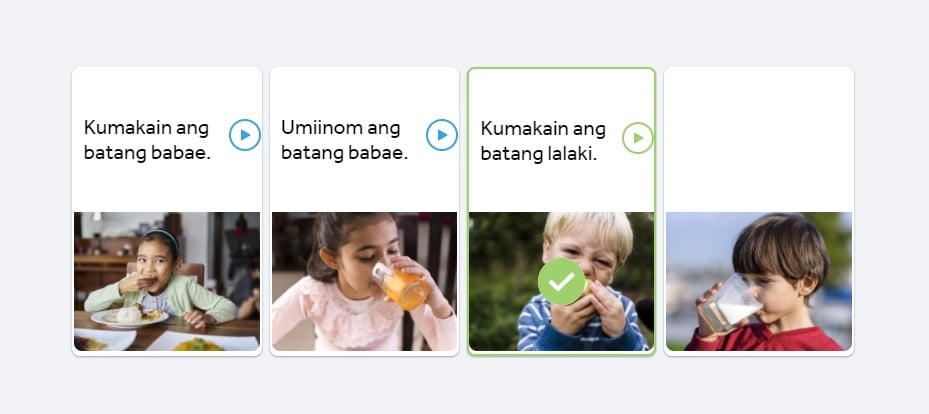
The same words are repeated over and over as you progress, in gradually increasing chunks of language and in different situations. There’s a linear progression from introductory language in level 1 (one or two words) to building long sentences at the higher levels.
The lessons all work in this way. You’ll be prompted to:
- Match images with words you hear and see simultaneously
- Match images with words you just hear
- Say words or phrases you hear
- Say word segments you hear (phonetics)
- Type words or phrases you hear
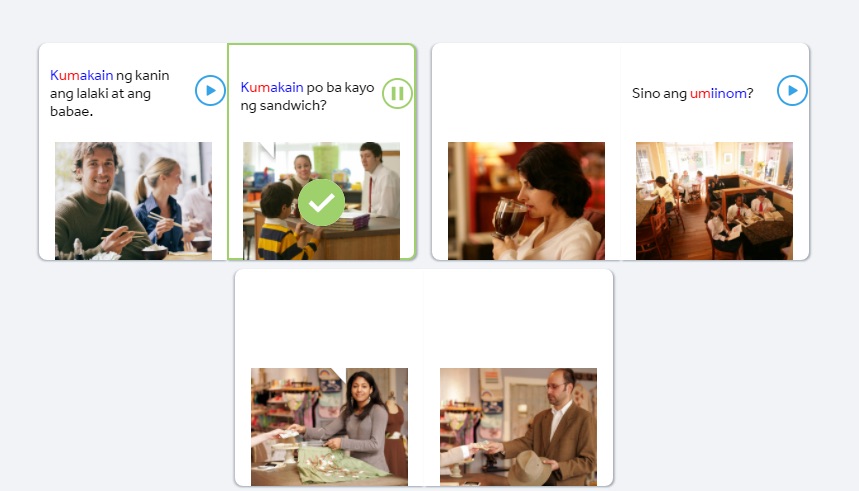
I tried this out with a language that’s completely new to me (Tagalog). After numerous lessons, I realised I was just guessing answers based on the singular and plural pronoun words, which were easy to match to the photographs. So although the vocabulary for people and objects stuck, the verbs didn’t.
By higher levels I remembered the verbs, but other parts of speech were just guesswork based on the pictures. For this reason, I never felt challenged to absorb the nuances of the language in a natural way.
When you achieve a certain level, you can also sign up for live streamed classes with a tutor. These are only 15 – 20 minutes long and you won’t be alone with the tutor.
What I Like About Rosetta Stone
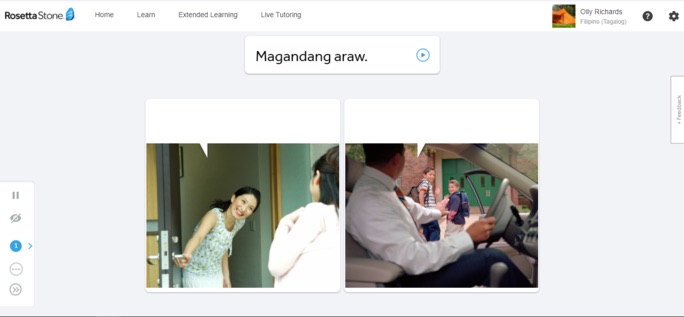
- Because of the high level of repetition, it’s very good for building a really solid foundation of vocabulary and phrases. There’s a logical progression from simple words to a range of more complex sentence structures. You’re also presented with the same words in different situations, which works well in gender-sensitive languages, or those with complex verb conjugations.
- I like that from the very first vocabulary lessons, both singular and plural forms are introduced.
- The speakers sound authentic and the audios are great. This makes a huge difference to the overall quality.
- The use of repetition, visual clues and forcing you to rely on your powers of deduction is a method that works – if you have the patience.
- The speaking component is very good in that you’re obliged to try and say the correct words. For the most part, I found this tool picks up your voice well and pushes you to pronounce things clearly.
- Grammar isn’t explicitly explained. I have mixed feelings about this, so here’s the good: the pictures very clearly give context, and you’re supposed to infer the correct meaning from them. As the course progresses, you keep seeing similar patterns, so the grammar rules become obvious to you over time. This passive way of learning grammar is good – it just takes longer.
- Like Babbel, Rosetta Stone is very simple to use, with an uncomplicated layout.
What I Don’t Like About Rosetta Stone

- This is not really immersion, regardless of how they sell it. Learning phrases by hearing them repeated dozens of times by a recorded voice is very different to hearing natural, authentic speech from a native speaker. Babbel’s conversational phrases are a lot better.
- The phonics lessons in the reading sessions seem a bit childish for adult learners. These are supposed to help you get individual syllables right, but for English speakers, I don’t see any value in repeating sounds like ‘ba’ or ‘ma’. Repeating phonetic chunks of a word is only useful for sounds you’ve never made before – such as certain Arabic letters, or perhaps the rolled ‘R’.
- Boring, slow exercises that are even less inspiring than Babbel’s.
- No cultural relevance, which is a bit disappointing for a language course that’s been around forever. The visual content is the same across all languages; every picture you see appears in all the courses – only the language changes. From an immersion perspective, at the very least, it would be awesome to see photographs that actually make sense for the culture you’re learning about!
- Not a great option for writing or speaking skills. You don’t really get to create your own sentences or think about different ways to communicate. In spite of the absence of English, there’s little opportunity to really ‘feel’ the language you’re learning.
- I found the lack of English support a bit limiting. The logic behind ‘learning like a baby’ is sound, but since we’re adults who already know how to communicate with words, this method can be adapted for maximum efficiency! With languages that use a non-Latin script, especially, one can’t rely on understanding being intuitive. You’d learn more quickly with simple explanations in English.
- Expensive for what you get. Sure you can tackle as many languages as you want for one price, but that’s only going to be useful with a lifetime subscription. One language a year is about as much as most people can realistically handle.
Babbel vs Rosetta Stone: Review Options
Even when it feels like you’re sailing through a course, it’s important to review regularly and observe how you’re really doing. Reviewing helps you to see gaps in your acquisition of the language, and strengthens your ability to remember in the long run.
So, how do Rosetta Stone and Babbel measure up?
Babbel gives you four optional ways to review at the end of each lesson: with flashcards, or with listening, speaking or writing exercises. During the lessons, you’re obligated to review while you learn, since you can’t advance until you get an answer right. This forces you to keep trying!
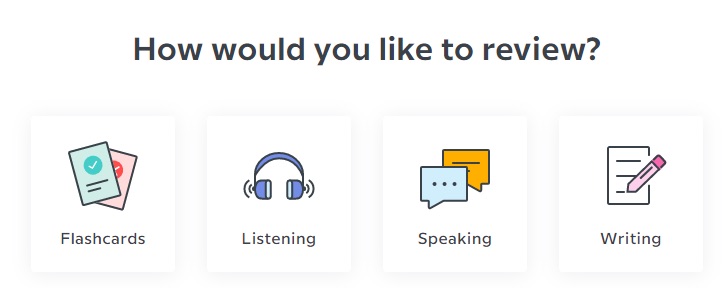
Rosetta Stone doesn’t have a separate review section. At the end of a lesson, if you didn’t score high enough, you’re given the option of repeating it to pass that lesson. You can see a breakdown of your scores for individual skills: pronunciation, vocabulary, grammar, reading and writing. This part is helpful for seeing where your strengths and weaknesses lie.
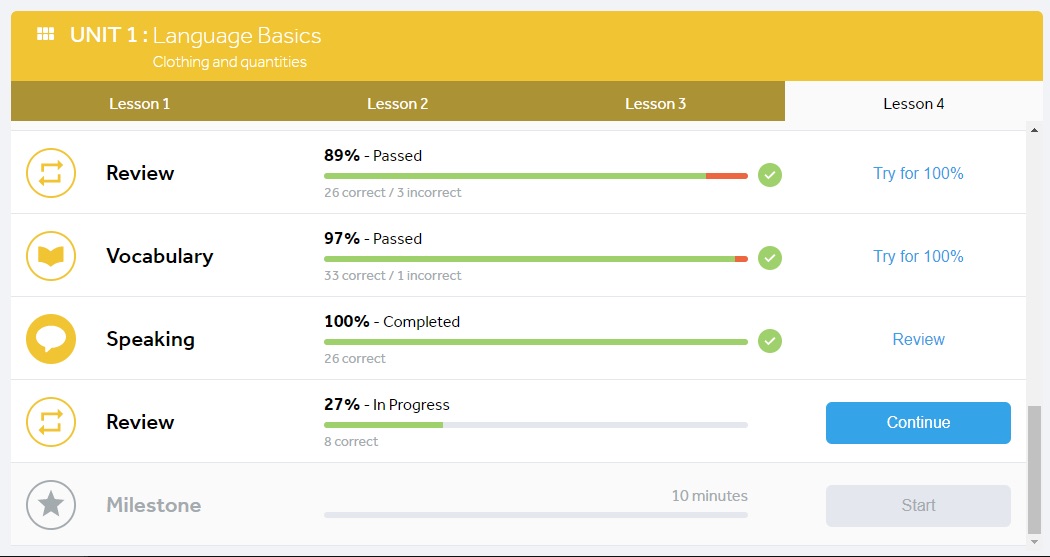
Babbel vs Rosetta Stone: Extra Features
Babbel has some extra features that are quite cool:
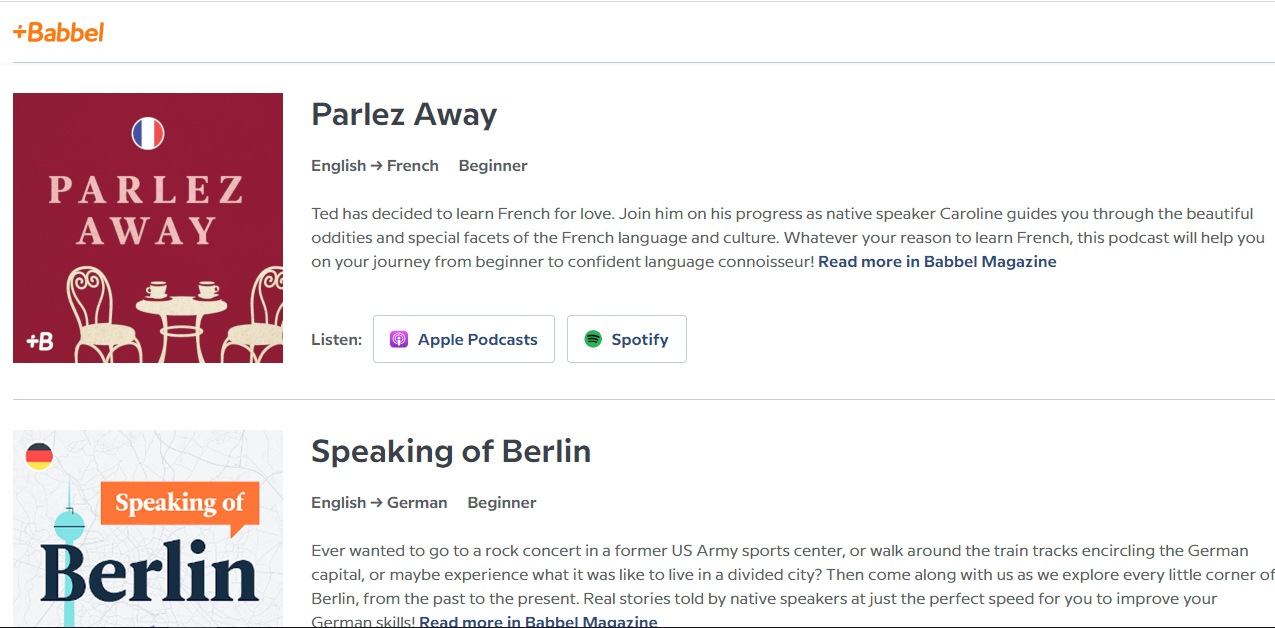
- A few supplementary courses per language, based on specific skills and interests – such as ‘Countries and Traditions’, ‘Travel Dialogues’ or ‘Tongue Twisters’. You can also choose a quick refresher course if you studied the language a long time ago, which is helpful to figure out what level you’re at.
- Podcasts for learners studying Italian, German, French or Spanish. Some have quite a lot of English in them; others are monolingual. The Spanish-only podcast series called ‘Palabras Bravas’ is awesome!
- Babbel Live – optional live classes you can join for German, French and Spanish (at a fee).
Rosetta Stone also has a few extra features you might enjoy:
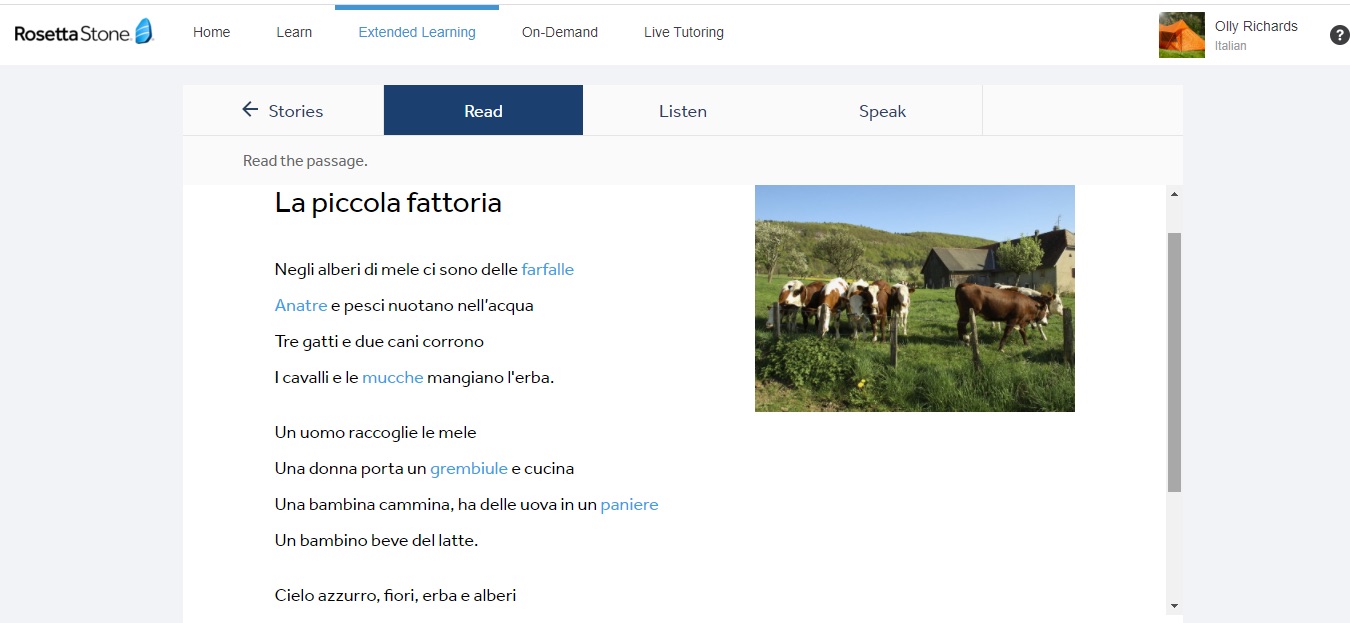
- ‘Stories’ is the extra feature I like best. A ‘story’ is a few paragraphs that you first read, then listen to a native speaker say, and then record yourself saying. The stories get more difficult as you go to higher levels and they’re really great comprehension and speaking practice. I was only dissatisfied with the voice recorder, which doesn’t always accept your accent.
- A phrasebook comprising a few categories of useful sentences from the lessons. You can listen to a native speaker say them and then practice them yourself with the voice recorder.
- Audio Companion is a tool to download MP3 practice sessions, which is handy for when you’re on the go or offline.
- ‘On demand’ is a video section where you can watch quick clips about culture, or get some conversation tips. For example, Italian has a one minute video clip on all the ways you can use the word ‘allora’.
- ‘Seek & Speak’ is a fun extra which enables users to point their iPhone’s camera at an object and receive a translation in the language they’re learning. It’s only available in a few languages.
Babbel vs Rosetta Stone: The Cost
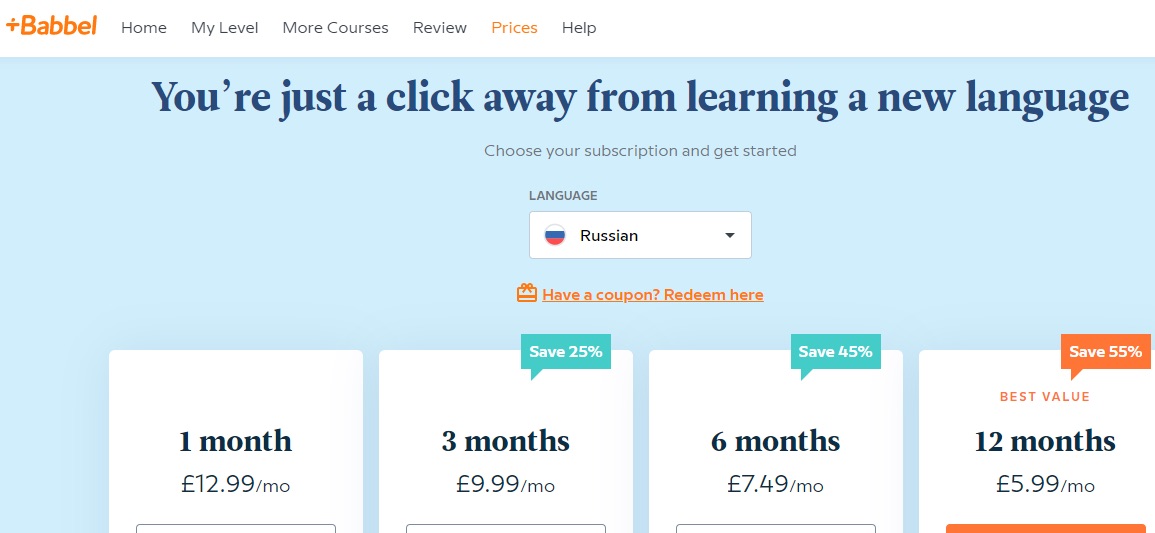
Babbel: After a 7-day trial period, during which you can try out the first lesson of each course, you will need to pay to keep learning. Prices are per language and as you may expect, the longer you subscribe for, the cheaper the deal. Babbel offers a 20-day money back guarantee.
The cost of a 12-month Babbel subscription is $83.40 USD.
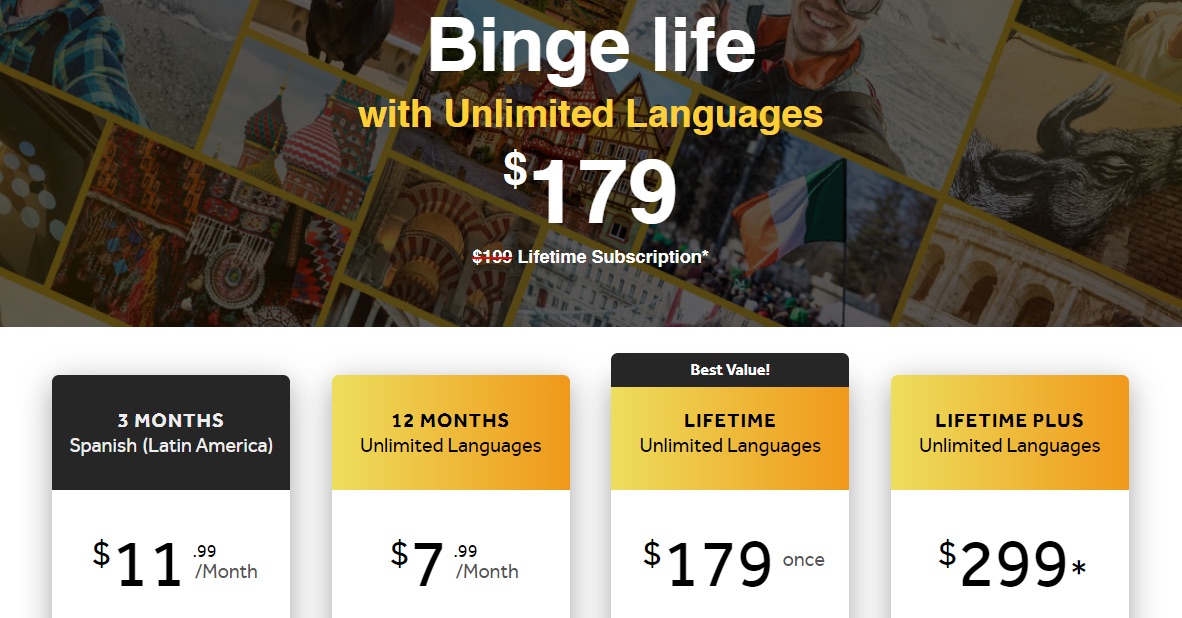
Rosetta Stone: There’s a 3-day free trial period, after which you can choose between a few subscription options. The Unlimited Languages deal doesn’t apply with the 3-month subscription, only 12 months or longer. They offer a 30-day money back guarantee, but only if you purchase the course directly from Rosetta Stone (i.e. not from a retailer).
The cost of a 12-month Rosetta Stone subscription is $95.88 USD.
Babbel vs Rosetta Stone: Final Verdict
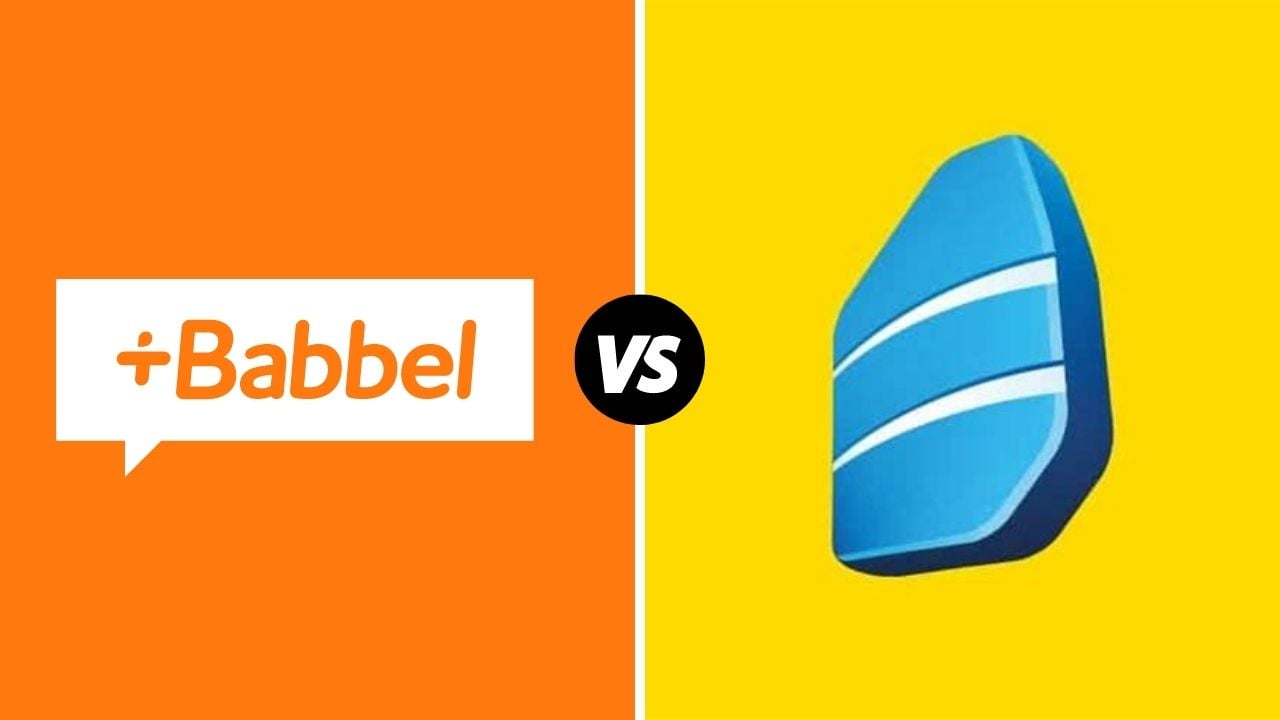
If I were to choose between the two, I’d definitely go with Babbel.
While both are good for building a strong vocabulary base, Babbel offers better opportunities to hear real-life conversational phrases. While this isn’t enough to make you fluent, it’s the better choice if you want to practice talking to people naturally. I also prefer it for the helpful grammar tips in English.
Rosetta Stone’s value is in memorization techniques, so it will certainly help you lock in plenty of words and phrases. I found the overall experience tiresome, though.
If you’re keen to try Babbel or Rosetta Stone for yourself, I highly recommend using the free trials before committing. Be sure to look at the specific language you want to learn, so that you know exactly how many fluency levels will be available to you.
However, if you're looking for a comprehensive beginner programme that will take you all the way to an intermediate language level and that uses a much more fun, engaging and effective method, then I've got something that might suit you better…
StoryLearning: A Better Alternative To Babbel or Rosetta Stone

While these apps can be handy for complete beginners, they are seriously lacking in vibrance! I wouldn’t have come this far without the belief that learning a new language ought to feel like an exciting adventure. Honestly, neither of these apps have what it takes to give you that kind of all-in, immersive experience.
That's why Uncovered exists.
Uncovered is a comprehensive online beginner course that takes you from a complete beginner in a language, up to an intermediate level. And it's fuelled by a fun and unique method called StoryLearning®.
StoryLearning is a process that was invented to teach you languages naturally. It’s so natural, in fact, that it’s based on how human beings learn their native language.
In the course, you'll learn through an exciting original story in your language of choice, written especially for beginner learners. Every word is intentional, designed for optimal learning to take place.
Though you learn through story, you also have a native teacher and experienced language learner by your side all the way through the course. She offers support with explanations in English and tips to help you learn the material fast.
Uncovered teaches all of the key aspects of the language: reading, listening, vocabulary, grammar, pronunciation and speaking. So by the time you've finished, you'll be a confident intermediate level language speaker, ready to go out and actually use your new language in the real world!
What You Get With Uncovered

- Complete 20-module course to learn to speak your new language with confidence through StoryLearning™. This is a method that relies on your brain's natural way of learning.
- 80+ video lessons with your experienced language teacher. You'll learn with the same method that's attracted worldwide attention, from the BBC, Independent, Open University, European Commission, El País, and more!
- Learn the secrets I used to learn 8 languages and how to use them yourself to learn to speak with confidence & take part fully in conversations with native speakers.
- Fully downloadable programme so you can learn faster – anywhere, any time, and on any device… even without an internet connection!
- Complete learning material, including audiobook, translations, printable worksheets… everything you need to get started and find success with your language learning!
- Expert pronunciation training videos, so you can perfect your pronunciation and speak like a native from the start.
- Money-back guarantee, so you can buy without risk today, and get a full refund if you don't love it.
If you're determined to learn a language and looking for the most fun and effective language course around, I'm confident you'll love Uncovered!Ready to start? Click here to find out more about Uncovered and start your language learning journey!

Olly Richards
Creator of the StoryLearning® Method
Olly Richards is a renowned polyglot and language learning expert with over 15 years of experience teaching millions through his innovative StoryLearning® method. He is the creator of StoryLearning, one of the world's largest language learning blogs with 500,000+ monthly readers.
Olly has authored 30+ language learning books and courses, including the bestselling "Short Stories" series published by Teach Yourself.
When not developing new teaching methods, Richards practices what he preaches—he speaks 8 languages fluently and continues learning new ones through his own methodology.








































